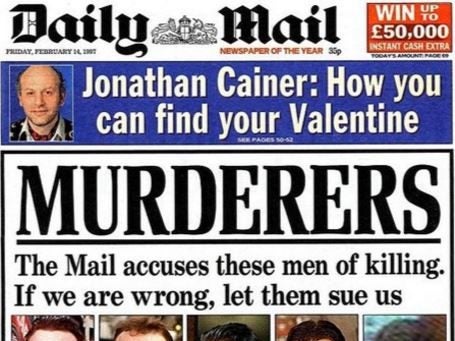
A former top Daily Mail lawyer has revealed he was “very confident” after signing off the newspaper’s infamous “Murderers” front page accusing five men of killing black teenager Stephen Lawrence in 1997.
Eddie Young, who was group legal adviser at Mail publisher Associated Newspapers at the time, said that although the headline was a risk: “It didn’t keep me awake at night”.
Editor Paul Dacre and his team decided to run the front page, with the sub-deck “The Mail accuses these men of killing. If we are wrong, let them sue us” four years after Lawrence was murdered by a gang of white men in a racially-motivated attack.
The paper was spurred into action after the five suspects, three of whom had already been acquitted of murder at trial, refused to answer any questions at Lawrence’s inquest – at which the coroner gave a verdict of unlawful killing.
Young has now detailed the day of 13 February 1997 from his perspective for the first time as part of a series about the murder of Stephen Lawrence on the Mail+ True Crime podcast hosted by associate news editor Stephen Wright, who was crime correspondent at the time.
Young said he was first told at about 2pm that Dacre was thinking of doing the headline, and that his first reaction was “that sounds pretty damaging”.
He then spent the afternoon assessing all the material on the case provided to him by the newsdesk with the goal “to get as much information as possible which would make me comfortable to think I could defend that sort of headline”.
“If I didn’t get that sort of information I would have said we can’t do it, it’s much too much of a risk,” he said.
Young acknowledged that he could not hope to prove in one afternoon what the prosecution had failed to do in court, but said by 6pm he was feeling “more and more comfortable… that at the very worst there were tremendous grounds for suspecting these people, even if in a court of law I couldn’t prove it that day that they were the murderers”.
He said the worst-case scenario was that the men would sue for libel, but they would be unable to ignore questions as they did in the coroners court and he thought giving evidence was “probably the last thing they ever wanted to do”.
The other question was how much they would be likely to be awarded in damages if they did win the case and Young felt a jury would be unlikely to, first, award the men victory and, secondly, award significant damages.
“My gut feel was that the five of them were guilty,” Young said. “That was everybody’s gut feel – I know that’s not good enough but that was my gut feeling… we were not dealing with people who are honest upright citizens on the face of it.
“We were dealing with five established racist thugs and I assessed that even if we were wrong and we lost the libel action, it would cost us in costs but it wouldn’t cost us much in damages.”
Contempt of court was not seen as a risk as there were no active proceedings in the case at the time.
Young therefore felt it was a “calculated, very well thought out risk” and told Dacre, who was at the backbench with the assistant editor, deputy editor, news editor and Wright, that he felt it was “okay”.
He told Dacre: “I’ve been through all the material… and I reckon we can justify that. If push comes to shove, I reckon we can justify that. I think it’s worth it.
“These guys are in my opinion 95% certain guilty, if not 100% guilty and they behaved in such a way as to tell the world they are guilty and they couldn’t care less because you can’t prove it.”
Young left the office at about 10pm that night, and said: “I didn’t really think ‘what have I done’. I was very confident that what I had done was okay. I obviously thought about it but it didn’t keep me awake at night.”

The Daily Mail’s Stephen Wright
Wright told Young he wished he had known he was so confident at the time because he was also called upon to answer three questions by Dacre at about 8pm: Did the police believe they had a strong case against these men, could they afford to sue and did he think they would sue?
“I felt like I was a contestant on Mastermind with the spotlight on me,” he said. “It was quite a dramatic moment because by then the atmosphere in the newsroom was one of nervous excitement.
“I took a sharp intake of breath and said it was my understanding that the case against the suspects remained strong, that they were involved, and that only David Norris had access to any significant money, and I didn’t think they would sue.
“I gave honest advice to the editor but no-one could really predict what was going to happen and that was the bottom line.”
None of the five men ever sued the Mail and two, Gary Dobson and David Norris, were convicted of Lawrence’s murder in 2012.
The front page was credited with putting pressure on authorities to act, leading to the Macpherson Inquiry into the police investigation into Lawrence’s murder.
Email pged@pressgazette.co.uk to point out mistakes, provide story tips or send in a letter for publication on our "Letters Page" blog
